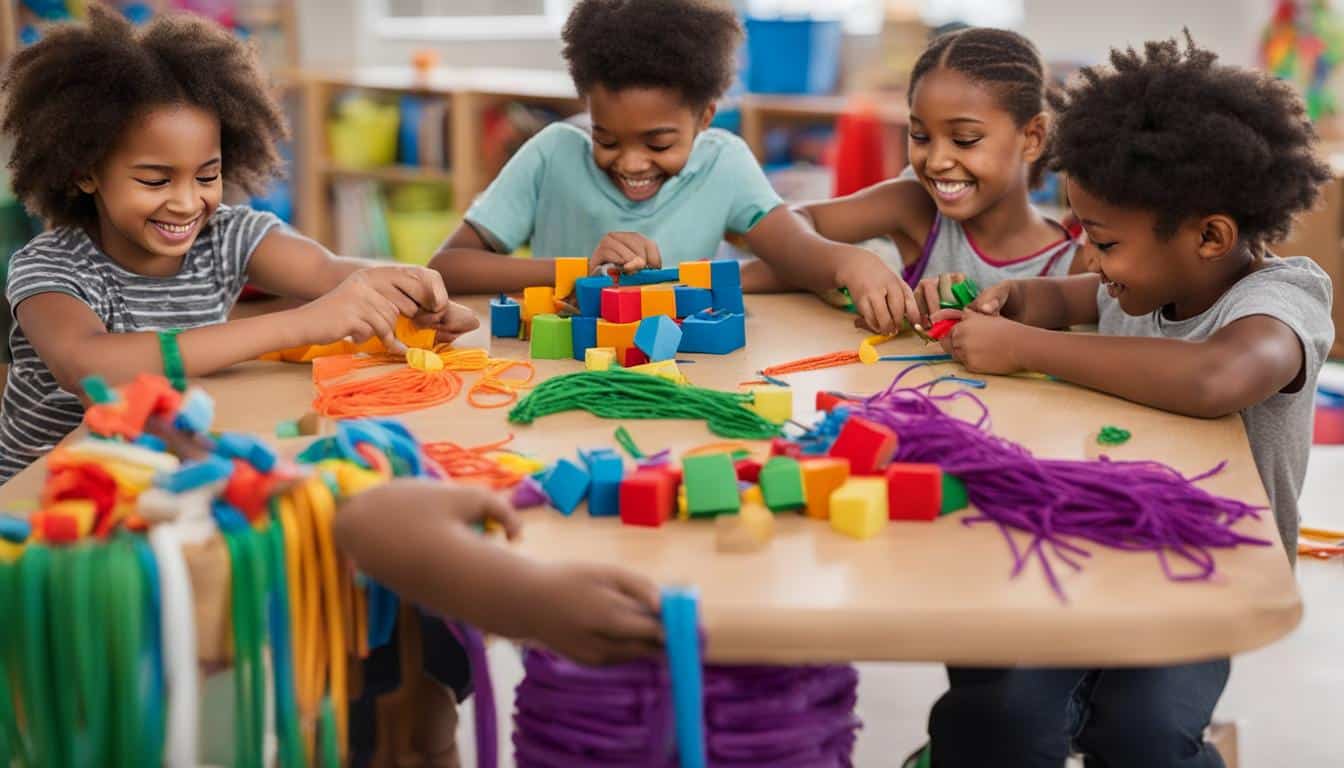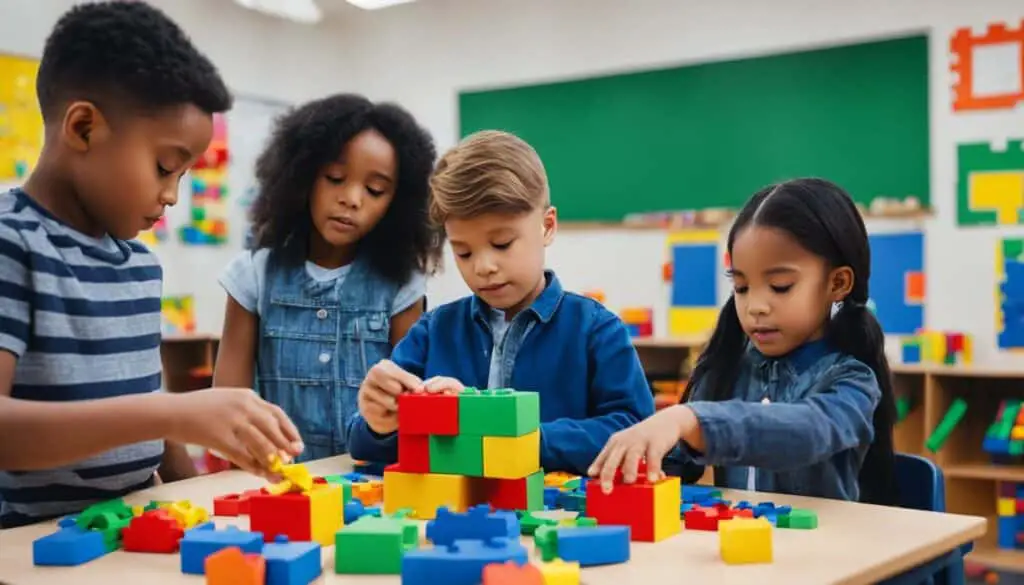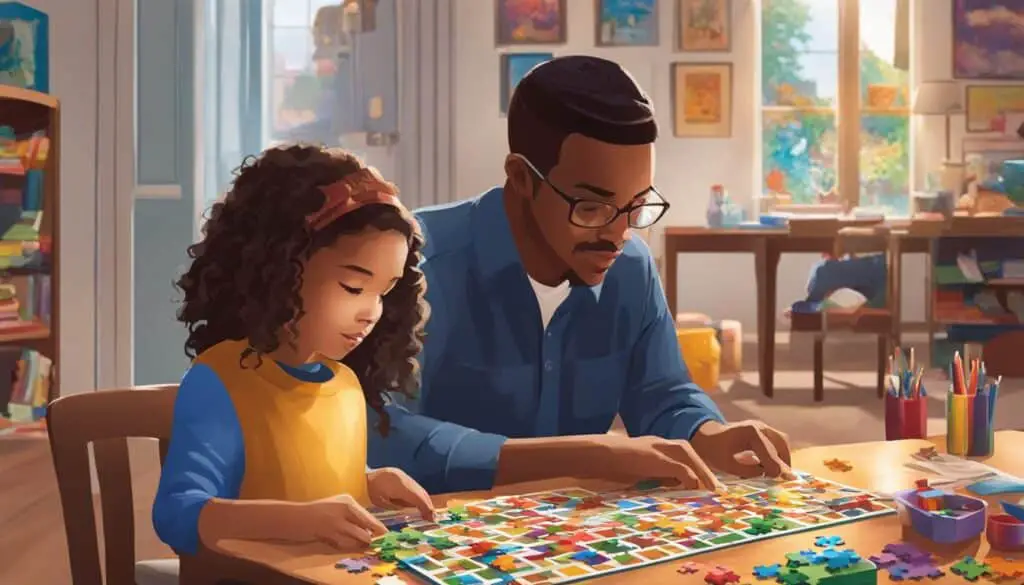
Fostering Creative Problem-Solving Skills in Kids
As a parent or educator, I understand the importance of nurturing creative problem-solving skills in children. By encouraging critical thinking and fostering innovation from an early age, we can equip our kids with the tools they need for future success.
Creative problem-solving skills go beyond finding solutions to everyday challenges. They involve the ability to think critically, approach problems with an open mind, and come up with unique and innovative solutions. Research has shown that individuals with strong problem-solving abilities are more likely to excel academically and professionally.
By fostering creativity and critical thinking, we can nurture these essential skills in our children. By providing them with opportunities to explore their imaginations, ask questions, and engage in open-ended activities, we can help them develop the problem-solving abilities they need to thrive.
Throughout this article, we will explore the importance of creative problem-solving skills, strategies to foster them, the benefits they bring, and how we can integrate them into education. We will also discuss the pivotal role parents play in nurturing these skills and the long-term impact they can have on our children’s future success.
Key Takeaways:
- Nurturing creative problem-solving skills is vital for future success.
- These skills involve critical thinking and innovation.
- Encouraging imagination and curiosity is important for fostering problem-solving abilities.
- Creative problem-solving skills enhance decision-making and communication.
- Integrating these skills into education prepares children for the challenges of the future.
Importance of Creative Problem-Solving Skills
Creative problem-solving skills are of utmost importance in a child’s development. These skills cultivate critical thinking abilities, enabling children to approach challenges with innovative solutions and adapt to various situations. Research consistently demonstrates that individuals with strong creative problem-solving abilities are more likely to excel academically and professionally.
When children possess strong critical thinking skills, they are equipped to analyze problems from different perspectives, leading to more comprehensive and effective problem-solving. This ability to think critically allows them to explore unique solutions that others may overlook, fostering innovation and creativity.
Moreover, creative problem-solving skills benefit children beyond their academic endeavors. They empower children to become resilient individuals who can navigate through complex problems and make informed decisions. These skills also enhance communication abilities, helping children express their ideas and collaborate effectively with others.
“Encouraging children to develop their creative problem-solving skills is an investment in their future success.”
By nurturing creative problem-solving skills in children, we equip them with the tools they need to thrive in an ever-evolving world. These skills are not only essential for academic achievement but also crucial for building a foundation for future success in various domains of life.
| Benefits of Creative Problem-Solving Skills |
|---|
| Enhanced critical thinking |
| Better decision-making |
| Increased innovation |
| Improved communication |
Strategies to Nurture Creative Problem-Solving Skills
Foster your child’s creative problem-solving skills by employing various effective strategies. These strategies encourage imagination, promote curiosity, provide open-ended activities, and foster collaboration.
Encouraging Imagination and Curiosity
Stimulating your child’s imagination and curiosity is a powerful way to enhance their problem-solving abilities. Engage them in storytelling sessions where they can imagine different scenarios and come up with creative solutions. Encourage them to ask questions and explore new ideas, fostering curiosity and a thirst for knowledge.
Hands-On Activities
Hands-on activities play a crucial role in nurturing creative problem-solving skills. Provide your child with opportunities to engage in open-ended activities such as building blocks, arts and crafts, or science experiments. These activities encourage critical thinking, experimentation, and problem-solving skills as they navigate challenges and find solutions.
Promoting Open-Ended Activities
Open-ended activities allow children to explore multiple solutions and exercise their creativity. Encourage your child to engage in activities that have no right or wrong answers, such as brainstorming sessions, role-playing, or creative writing. This promotes divergent thinking and encourages them to think outside the box when faced with problems.
Collaboration and Group Projects
Collaboration is an essential component of creative problem-solving. Encourage your child to work with others on projects or participate in group activities. Collaborating with peers helps them gain different perspectives, learn from others, and develop effective communication and teamwork skills.
“Creativity is just connecting things. When you ask creative people how they did something, they feel a little guilty because they didn’t really do it. They just saw something.” – Steve Jobs
By implementing these strategies, you can provide a nurturing environment that fosters your child’s creative problem-solving skills. Encouraging imagination, promoting curiosity, providing open-ended activities, and fostering collaboration are key elements in developing their critical thinking and innovative problem-solving abilities.
| Strategies | Benefits |
|---|---|
| Encouraging imagination and curiosity | – Stimulates creativity – Sparks innovative thinking – Promotes out-of-the-box problem-solving |
| Hands-On Activities | – Enhances critical thinking – Develops problem-solving skills – Fosters experimentation and exploration |
| Promoting Open-Ended Activities | – Encourages divergent thinking – Expands creative problem-solving approaches – Nurtures flexibility in problem-solving |
| Collaboration and Group Projects | – Enhances communication and teamwork skills – Provides diverse perspectives and ideas – Strengthens problem-solving through collective intelligence |
Benefits of Creative Problem-Solving Skills in Kids
Developing creative problem-solving skills in kids offers a multitude of advantages that positively impact their overall development. These skills not only enhance critical thinking abilities but also empower children to approach challenges with innovative and effective solutions. Let’s explore the significant benefits that come with nurturing creative problem-solving skills in young minds.
Enhanced Critical Thinking
Creative problem-solving skills foster enhanced critical thinking in children. These skills enable them to analyze complex problems from multiple perspectives and think outside the box to find unique and effective solutions. By expanding their critical thinking abilities, kids develop a comprehensive approach to problem-solving, encouraging strategic and thoughtful decision-making.
Better Decision-Making
Children with well-developed creative problem-solving skills tend to make better decisions in various aspects of life. The ability to assess a problem from different angles and generate innovative solutions enables kids to evaluate the potential outcomes of their choices. This skill empowers them to make informed decisions that consider both short-term and long-term consequences, contributing to improved decision-making abilities.
Increased Innovation
Creative problem-solving skills nurture a culture of innovation in children. As they explore different approaches to problem-solving, kids develop a mindset that embraces experimentation and risk-taking. This encourages them to think outside conventional boundaries, leading to the generation of fresh ideas and innovative solutions. By fostering innovation, creative problem-solving skills inspire children to become future drivers of positive change.
Improved Communication
Effective communication is crucial for conveying ideas and collaborating with others. Creative problem-solving skills enhance a child’s ability to articulate their thoughts and ideas clearly and effectively. Through this skill, children learn to communicate their problem-solving strategies, enabling them to collaborate with peers, parents, and educators in finding optimal solutions. Improved communication further strengthens their interpersonal skills, fostering positive relationships and effective teamwork.
| Benefits of Creative Problem-Solving Skills in Kids |
|---|
| Enhanced Critical Thinking |
| Better Decision-Making |
| Increased Innovation |
| Improved Communication |
Creative problem-solving skills offer a range of lifelong benefits for children. From enhanced critical thinking and better decision-making to increased innovation and improved communication, these skills empower young minds to excel in all areas of life. By prioritizing the development of creative problem-solving skills, parents and educators provide children with valuable tools that pave the way for future success.
Integrating Creative Problem-Solving into Education
In today’s rapidly evolving world, it is crucial to equip children with the skills they need to navigate and thrive in a complex and uncertain future. One such skill is creative problem-solving, which enables students to tackle challenges with innovative solutions and real-life applications.
Schools have the opportunity to enhance their curriculum by integrating creative problem-solving into education. One effective approach is through project-based learning, where students engage in hands-on activities that require them to think critically and apply their problem-solving skills in real-world scenarios.
Encouraging experimentation is another valuable strategy to foster creative problem-solving abilities. Schools can provide opportunities for students to explore different approaches, take risks, and learn from both successes and failures. This approach not only promotes critical thinking but also helps students develop resilience and adaptability.
“Education is not the filling of a pail, but the lighting of a fire.” – William Butler Yeats
Real-Life Applications
Integrating creative problem-solving into education allows students to see the relevance of their learning in real-life situations. By tackling complex problems and finding solutions that have practical applications, students develop a deeper understanding of the subject matter and how it relates to the world around them.
For example, in a science class, students can engage in hands-on experiments and investigations to solve real-world problems related to environmental sustainability. This not only enhances their scientific knowledge but also cultivates their ability to think creatively and find innovative solutions.

Curriculum Enhancement
Integrating creative problem-solving into education also offers an opportunity to enhance the curriculum. By incorporating projects and activities that encourage critical thinking and problem-solving, schools can create a more engaging and interactive learning experience for students.
This approach moves away from traditional rote memorization and focuses on practical application, allowing students to connect with the subject matter on a deeper level. It empowers them to apply knowledge and skills to real-world situations, fostering a love for learning and creativity.
| Benefits of Integrating Creative Problem-Solving in Education |
|---|
| Enhanced critical thinking skills |
| Improved problem-solving abilities |
| Increased innovation and creativity |
| Development of practical skills |
| Increased engagement and motivation |
By integrating creative problem-solving into education, schools can create a learning environment that encourages students to think critically, apply their knowledge, and develop creative solutions. It prepares them for the challenges and opportunities they will face in the future, equipping them with essential skills for success.
Role of Parents in Fostering Creative Problem-Solving Skills
As parents, we have a fundamental role in nurturing our child’s creative problem-solving skills. By actively involving ourselves in their development, we can create an environment that promotes exploration, risk-taking, and the growth of their problem-solving abilities.
One of the ways we can support our children is by providing them with the necessary support and encouragement. When kids feel supported, they gain the confidence to take on challenges and think outside the box. By showing interest in their ideas and offering guidance, we foster their problem-solving skills and encourage them to tackle problems head-on.
Allowing our children to make mistakes is another crucial aspect of their development. Mistakes provide valuable learning opportunities and teach children to embrace failure as a stepping stone to success. By allowing them to make mistakes and learn from them, we empower them to become resilient problem solvers who are not afraid to try new approaches.
Encouraging exploration is also essential in fostering creative problem-solving skills. By providing a nurturing and open-minded environment, we give our children the freedom to explore their interests, ask questions, and seek solutions on their own. This exploration allows them to develop their critical thinking abilities and broaden their problem-solving toolkit.
“The role of parents in fostering creative problem-solving skills is invaluable. By providing support, encouraging exploration, and allowing mistakes, we empower our children to develop strong problem-solving abilities that will serve them throughout their lives.”
Engaging in problem-solving activities together is another effective way to foster these skills and strengthen the parent-child bond. By working on puzzles, solving riddles, or engaging in hands-on projects, we create a shared experience that not only enhances problem-solving abilities but also promotes bonding, communication, and teamwork.

By actively participating in our children’s creative problem-solving journey, we become their biggest supporters and advocates. Our involvement not only helps in the development of their problem-solving skills but also instills confidence, curiosity, and a love for learning.
Next, we will explore the benefits of fostering creative problem-solving skills in kids and how these skills contribute to their overall development.
Conclusion
Fostering creative problem-solving skills in children is essential for their development and future success. By nurturing these skills, we can equip our children with the tools they need to thrive in a rapidly evolving world.
Encouraging critical thinking and innovation not only enhances their problem-solving abilities but also prepares them to tackle challenges with confidence and resilience. Investing in the development of these crucial skills is an investment in the future of our children.
By integrating activities that foster creativity and critical thinking into education and providing support at home, we can help children unleash their full potential. Developing these problem-solving skills not only benefits the individual, but it also contributes to the overall growth and progress of our society.
FAQ
Why is fostering creative problem-solving skills important for kids?
Fostering creative problem-solving skills in kids is essential because it promotes critical thinking and innovation, which are crucial for their future success.
How can parents and educators nurture creative problem-solving skills in children?
Parents and educators can nurture creative problem-solving skills in children by encouraging imagination and curiosity through storytelling and hands-on activities. They can also provide open-ended activities and opportunities for collaboration to foster creativity and critical thinking.
What are the benefits of developing creative problem-solving skills in kids?
Developing creative problem-solving skills in kids has several benefits. It enhances their critical thinking abilities, allows them to analyze problems from different angles, and enables them to come up with innovative solutions. Additionally, children with strong creative problem-solving skills tend to make better decisions and communicate their ideas effectively.
How can creative problem-solving be integrated into education?
Creative problem-solving can be integrated into education by enhancing the curriculum with project-based learning, which encourages students to apply their problem-solving skills in real-life scenarios. Encouraging experimentation and providing opportunities for students to tackle complex problems with practical applications also strengthen their creative problem-solving abilities.
What is the role of parents in fostering creative problem-solving skills?
Parents play a fundamental role in nurturing their child’s creative problem-solving skills. By providing support and encouragement, parents can create an environment that promotes exploration and risk-taking. Allowing children to make mistakes and learn from them fosters their problem-solving abilities and builds resilience. Engaging in problem-solving activities together can also strengthen the parent-child bond.